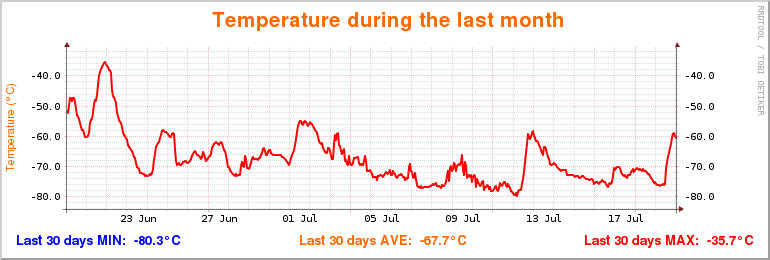25 July 2012 – First, on behalf of Concordia, I must say thank you for your images you have all sent in from all over the world. The sun has been gone what seems like a year now, when in fact it has just been 3 months. Daylight is a distant memory and it was excellent to have own our memories stirred by your photos — thank you!
I have received several questions and so as promised want to provide some answers:
- When are you going to write a recipe book Giorgio?
Asking Giorgio this question myself – he answered that he is collecting together all his recipes — some of which are from his upbringing and others are made up both on and off ‘the ice’! — and hopes to make a book about his many years of experiences cooking in Antarctica.
- My classmate Joanna Thirsk was the doctor at the SANAE base – I wonder if you ever have any contact with them? She did some research on T-3 and T-4 levels after prolonged exposure to darkness – do you find that you suffer any ill effects? Still, glad you’re celebrating!!
The unique aspect about Antarctica is its international collaboration – which really is an example to the rest of the world. We have contact with many of the overwintering stations in Antarctica including SANAE base. It is excellent on occasion to share photos and glimpses into the very different lives of the teams dotted around Antarctica. I have read Larry Palinkas’ research which remains world class on studying some of the internal biological changes associated with overwintering in Antarctica. So far, although it is difficult and you feel drained in energy without sunlight – for me, its mind over matter and anything is possible! we certainly enjoyed our midwinter celebrations, but as with any celebrations, there is always clearing up to be done afterwards! I consider myself to be quite fortunate in that I have remained healthy and quite resistant to the pressures and environmental stresses of such an extreme environment – but then with plenty of foreign expeditions – working to these challenges ‘all becomes just another day’s work’.
- The day/night alternation is ruling our biological clock. What is your experience of living in the darkness for several months on earth v.s the time you spend awaken and asleep? Do you tend to loose your time reference? Is it more difficult or more easy to wake up in the “morning”?
One of the most important aspects I have found whilst living overwintering is the difference between busy people and those without so many roles/ tasks. A busy and active mind can keep someone in regular check throughout the winter. But bear in mind also that being too busy can be just as detrimental as having to find ways to occupy substantial periods of free time. You have to find a balance and that can take many months in itself. It is strange, but reassuring to see that some people choose to overwinter multiple times in their life. Of course there is an attraction to Antarctica like no other continent. But some people just find life easier than others. It is a journey of personal discovery down here. You never know what you will find. In relation to sleep-wake cycles, if you have time, google around ‘free-running’ in sleep cycles. It quite often happens in Antarctica and certainly has happened here. We all try to maintain healthy and regular cycles but it sometimes just isn’t possible – one of the many challenges of living through the world’s longest, darkest and coldest winter.
- You had a video call with Andre Kuipers on ISS begin of June. A picture of the call seen from ISS was advertised. Would you have the equivalent from Concordia to share on Flickr?
We have video footage and still photos of the call. A few members of the group are working these now, in-between our vigorous research protocols. We will do our best to share these once we have edited. Obviously it is an incredibly interesting and unique experience that none of us will every forget – speaking to astronauts live in space – an extreme privilege. It was funny to see the ISS crew were as interested in us as we were in them- many experiences to share of living in similar states of isolation and in some ways, deprivation.
- How someone should go about being a crew member of an expedition like yours, to do research in Antarctica? I’m a geologist, and it’s a dream of mine to someday work over there…
There are many nationalities and organisations which send people for summer and/or winter periods in Antarctica. As a geologist – I am sure you would fit right in. However, not in our station – we are around 1100km from the coast – where only a tiny percentage of Antarctica’s land mass (rock) remains exposed without ice – and such areas are coastal. Depending where you are from (which nationality), you may be eligible for certain programmes e.g. if British – British Antarctic Survey, if American – National Science Foundation. But that is not a hard and fast rule- often there are research scientists joining Antarctic programmes in different countries. That is one of the best points about Antarctica! For example, whilst I am British, I am living on a French-Italian station!
- As you are based in one of the coldest and driest places on Earth, the analogy with Mars makes it, one would assume, a perfect test ground for Mars lander type experiments (when the winds are not too high). What kind of experiments would you like to conduct if you had a completely free and open book, and also, as a second question, do you ever venture out to hunt for meteorites?
I have often dreamed of testing Mars landers here at Concordia – perhaps air-dropping a lander on the ice, as if dropped on the polar regions of Mars. Having humans on the ground would prove hugely useful in being able to make repairs and monitor its progress as its systems and tools were tested- in similar temperatures to those found on the surface of Mars. But I would be more excited in testing space suits and vehicles. Sometimes, when walking back to the base from a distant scientific shelter both exhausted and suffering the effects of hypoxia, I imagine bounding effortlessly with less gravity over the sastrugi and strange, alien ice formations. This really is the closest you can come to living on the surface of another planet.
- Very interesting. I had heard that without a timepiece we tend to inhabit days that are approximately 20 minutes longer than common earth days. Is there any truth to this? It correlates beautifully with the length of a Martian day. Perhaps our internal body-clock is Martian.
There is an array of research on this subject available online and in journal articles. Without going into too much detail – you are correct in one opinion, among others also. I went nearly a week here avoiding clocks – only sticking to meal times – but even that was enough to keep me in some, albeit disrupted and irregular, biological rhythm. Some of Michel Siffre’s work in caves has best tried to emulate this ‘natural’ process. But again, there are so many other factors involved, depending on your environment in which you are testing – from hypoxia, to damp, to cold, to warm, to a complete absence of natural light. It is extremely difficult to replicate such studies with large enough numbers again and again to know which theory is correct – but your idea is as good and as well accepted as any.
I particularly like your idea comparing to the Martian Day. Especially with the recent release of the film Prometheus, which builds upon this theory. I guess one argument should be, maybe we shouldn’t go ‘too far’ looking for such answers.
- In relation to the unusual and extreme temperature fluctuations our crew has experienced this winter at Concordia Station How unusual are such high temperatures during winter if they would even be considered warm in summer? Delta T = -28 – (-45) = 17 °C in 24 hrs… such a ‘sudden warming” is not so unusual during the Antarctic night. Instead, I can’t figure out why the sky became cloudy while pressure was increasing. Please, could you ask a comment from Igor?
I have attached this graph which will emphasise to all the readers the extreme and unusual temperature changes we have had in just the past month – almost 50 degrees Celsius difference in fact! I asked Igor for his opinion – please find it below.
Igor, our station meteorologist’s reply:
Strong “warming events” are typical phenomena for the winter period in Antarctica. They occur with a period of the order of 10 days. In-spite of they were described at the beginning of 60th by soviet researcher Ostapenko, till now the understanding and description of mechanisms of this phenomenon is not complete. Shortly, it can be described as a passage (transport) of warm and humid air masses with the cloudiness formed at coastal zones across the continent due to a specific pattern of the pressure field above the continent. Much additional information on this phenomenon can be found on the internet in articles.
With kind regards, Dr. Igor Petenko





Recent Comments